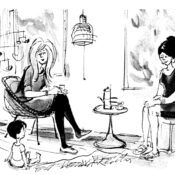Around the holidays, in a year no one could take actual journeys, some of my family members embarked on a journey of self-discovery. One minute they were sitting around the table sharing dumb videos on TikTok; the next minute, they were all experts on their personal “love language.”
They’d stumbled upon an online quiz based on the book The 5 Love Languages. In it, marriage counselor Gary Chapman claims that couples often failed to understand each other’s ways of “expressing and receiving love.” A husband might show his devotion by spending an entire Saturday replacing a broken toilet. The wife might feel hurt that it’s their wedding anniversary and her “surprise gift” is an eyeful of plumber’s butt.
The idea is that, if you know another person’s “love language,” you can tailor your loving behavior so they won’t end up hating you. The online quiz comes in versions for couples, singles, teens, and others.
My husband, 20-something stepdaughter, and preteen daughter took the quiz. After answering a series of questions, they were scored on how much they valued five things: quality time, receiving gifts, physical touch, words of affirmation, and acts of service. The one they valued the most was their “love language.”
Incredibly, after nine months of enforced lockdown, all three of them placed a high value on quality time.
“My main love language is being close to the people I love!” one of them chirped happily across the table.
“Mine too! I feel most loved when my loved one is by my side.”
“My other love language is physical touch. Ideally, I am physically close to the people I love all the time, never more than a room away. I love that!”
As I listened from the kitchen, my blood ran cold. I loved my family, but at this point, togetherness was not at the top of my list. My main love language at the end of 2020 was a solo ticket to Hawaii and $10,000 cash. What I truly desired was a game show jackpot: a fun, life-changing prize for me and me alone!
“Mom! You should take the quiz,” someone called gaily from across the room.
“No. That’s okay. I really have to scrub this tile with a grout brush and . . . can these preserves.”
In truth, I was afraid to take the quiz. The numbers wouldn’t lie; the probing questions would reveal too much. Deep down, my family already suspected I had the “love profile” of a pleasure-seeking misanthrope who wanted to be left alone much of the day. Though I loved being a wife and mom, it could be too much of a good thing, especially now.
Who was going to give me hot stone massages during a shutdown? Who was going to make sure I didn’t grow a thick, dark unibrow like Bert the Muppet? Who was going to utter four of my favorite words — “Pick out a color” — when I needed an hour off to flip through magazines and get my toenails done? Who was going to swing by my Mexican restaurant table and utter six more of my favorite words: “Looks like you need more chips”?
Not these jokers, the ones I lived with. Their love languages included “Mom bringing me a ham sandwich in my room” and “Mom spending an hour every day talking me through Common Core math, a subject she neither likes nor understands.” Every day, I tried to give them the things they loved. No wonder they all gave togetherness high marks!
As for my own preferences, honesty did not seem the best policy. The quiz might dangle things in front of me that I could not pass up, like the ringing silence of profound solitude. What would my family think of that?
I wasn’t about to prove, decisively, that they were all nicer than me.
Eventually, in deep secrecy, I took the quiz. I answered as truthfully as I could, but some of the questions confused me. Many of the choices involved receiving small gifts, or surprise gifts, or thoughtful, just-because gifts. Would I prefer an expensive gift to, say, having someone fold the laundry?
Who the hell would be giving me all these gifts? Trying to imagine this sort of life was a mind-bending exercise. My children were past the age of showering me with drawings, crude pottery, and necklaces made with beads and string. Their gifts to me were now abstract, like “going to church without whining.”
My husband was not a smooth-talking seducer with a diamond in a velvet box in his breast pocket; he was more the toilet-installing type. The task of buying me something seemed to intimidate him a little. I had strong opinions about clothes, jewelry, and pretty much everything else. How could he hope to get it right? Three times a year, he dutifully coughed up a gift, but we were both happier if he did jobs around the house and I shopped for myself.
Because receiving gifts befuddled me, I scored lowest in that love language: a measly 3 percent. My next lowest score, at 17 percent, was quality time. I had a middling interest in physical touch and words of affirmation.
But my highest score by far, at 37 percent, was acts of service. “Absolutely anything you do to ease the burden of responsibilities weighing on an ‘Acts of Service’ person would speak volumes,” the quiz explained. “The words he or she most wants to hear: ‘Let me do that for you.’”
My 12-year-old daughter came upon me pondering these insights. “You finally took the quiz!” she said. “Let me see your results.”
She spent a minute studying my scores with sharp eyes. Then, with a tween’s trademark bluntness, she summed them up: “So, your love language is people being your servant.”
“Don’t tell anyone else about this,” I said.
Then I gave her five dollars to scram.
Featured image: ploy2907; BackWood; Anna Frajtova; Farah Sadikhova; Simakova Mariia / Shutterstock
Become a Saturday Evening Post member and enjoy unlimited access. Subscribe now



